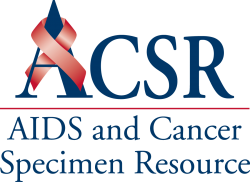The ACSR Young Investigator Pilot Award (YIPA) is targeted toward junior investigators and faculty with innovative ideas for translational, clinical and/or behavioral-epidemiological HIV-related research that utilizes ACSR’s annotated biospecimens collected from people living with HIV/AIDS and controls from both pre and post-HAART periods. Awards are intended for pilot studies to show feasibility and/or to generate preliminary data that will support efforts to procure future funding of larger research projects.
2021 (Fall) Pilot Award Recipients
 Melissa Jayne Blumenthal, PhD
Melissa Jayne Blumenthal, PhD
Postdoctoral Fellow, International Centre for Genetic Engineering and Biotechnology, Department of Integrative Biomedical Sciences, Faculty of Health Sciences, University of Cape Town
Project: KSHV infection in inflammation-related disease and death in HIV patients
Overview: Kaposi’s sarcoma-associated herpesvirus (KSHV) is an oncogenic virus that causes HIV-related Kaposi’s sarcoma (KS) as well as primary effusion lymphoma (PEL), multicentric Castleman disease (MCD) and KSHV inflammatory cytokine syndrome (KICS) in HIV patients. We propose to develop a screening tool utilising KSHV viral load measurement and markers of inflammation to predict KSHV-related disease progression and outcome, particularly in low resource settings where highly specialized diagnosis is challenging. To do so, we will assess KSHV seroprevalence and viral load in HIV positive patients with and without KS as well as markers of inflammation and relate these to disease progression and outcome.
 Arti Vashist, PhD
Arti Vashist, PhD
Assistant Professor, Department of Immunology and Nanomedicine, Herbert Wertheim College of Medicine, Florida International University
Project: Identify biomarkers of HIV treatment to develop nanogel-based anti-HIV regimen
Overview: This nanogel system provides proof-of-concept of combining autofluorescence and therapeutics. The anti-viral and anti-inflammatory biopolymeric nanogels are synthesized to inhibit HIV-induced inflammation, which allows to develop new therapies to improve tumor and cancer cells sensitivity to chemotherapy and immunotherapy.
 Yulong Wei, PhD
Yulong Wei, PhD
Postdoctoral Associate, Department of Microbial Pathogenesis, Yale School of Medicine
Project: Impact of HIV-1 infection on epigenetic regulations of anti-tumor immunity
Overview: Our objective is to determine how HIV-1 infection impacts Diffuse Large B-Cell Lymphoma (DLBCL) development. The key question we aim to answer is why HIV-1-infected individuals are at dramatically higher risk of developing DLBCL even after receiving antiretroviral therapy treatment. Our long-term goal is to identify novel therapeutic strategies that will improve anti-tumor immunity and mitigate risk of developing lymphoma in HIV-1-infected individuals.
2021 (Spring) Pilot Award Recipients
 Casey L. McAtee, MD
Casey L. McAtee, MD
Instructor of Pediatric Hematology-Oncology, Baylor College of Medicine
Project: A pilot study to detect circulating tumor DNA in epidemic Kaposi sarcoma
Overview: Kaposi sarcoma (KS) remains a common and fatal cancer among persons living with HIV, particularly in sub-Saharan Africa where accurate diagnosis, appropriate disease monitoring, and optimal survival outcomes are limited by extremely low resources. Appropriately diagnosing and monitoring the disease requires infrastructure that is often unavailable in the resource-limited settings where most patients with the disease live. Borrowing from breakthroughs in colon, breast, and lung cancer, this study will be a proof-of-concept that a simple blood test rather than invasive and costly surgical biopsies can be used to diagnose and monitor KS in children and adults.
 Wen Meng, PhD
Wen Meng, PhD
Post-doctoral Associate, Department of Microbiology and Molecular Genetics, University of Pittsburgh School of Medicine
Project: Pilot Study of Microbiota in AIDS-Kaposi’s sarcoma Development
Overview: Kaposi’s sarcoma (KS) is the most common cancer in HIV-infected patients caused by infection of Kaposi’s sarcoma-associated herpesvirus (KSHV). Despite intensive studies, factors affecting KS development remain unclear. This pilot study will use ACSR’s repository samples and databases to examine the role of bacteria population in the inflammation and development of KS in AIDS patients with the goal to provide insights into the pathogenesis of AIDS-KS.
 Lorraine Z. Mutsvunguma, PhD
Lorraine Z. Mutsvunguma, PhD
Postdoctoral Fellow, Department of Immuno-Oncology, Beckman Research Institute, City of Hope
Project: Isolation of potent KSHV neutralizing antibodies from naturally infected people
Overview: Kaposi sarcoma-associated herpesvirus (KSHV) causes several cancers including Kaposi sarcoma (KS) in immunocompromised individuals such as those living with HIV/AIDS. Although KS affects quality of life for many individuals, there currently is no vaccine to prevent KSHV infection. By identifying antibodies capable of neutralizing KSHV from individuals naturally infected with KSHV, I will gain information that will help in the design of effective vaccines.
 Innocent Mutyaba, MBChC, MMed
Innocent Mutyaba, MBChC, MMed
Fellow, Hutchinson Centre Research Institute of Uganda, Kampala, Uganda
Project: Identifying Predictors of Kaposi Sarcoma Immune Reconstitution Inflammatory Syndrome
Overview: Kaposi sarcoma immune reconstitution inflammatory syndrome (KS-IRIS) is a frequent complication following initiation of antiretroviral therapy (ART), particularly in sub-Saharan Africa. Biologic markers of KS-IRIS that can be assessed at onset of KS-IRIS symptoms are needed to provide insight into KS-IRIS pathogenesis and to facilitate prevention, early diagnosis and appropriate management of KS-IRIS. This study will leverage existing KS cohort samples in the ACSR biorepository to measure inflammatory markers in pre-treatment blood specimens to augment study datasets and identify predictors of KS-IRIS in these cohorts.
2017 Pilot Award Recipients
 Genevieve Clutton, PhD
Genevieve Clutton, PhD
Post-doctoral Research Associate, UNC Chapel Hill School of Medicine, Dept. of Microbiology and Immunology
Project: CD8 T Cell Function and Metabolism in Kaposi’s sarcoma (KS) Patients Following ART Initiation
Overview: KS is the most common AIDS-associated malignancy worldwide but is rare in HIV-uninfected, immunocompetent individuals. Most HIV-infected individuals with KS experience remission following anti-retroviral therapy (ART), likely due to improved immune function, but a minority do not. We will examine if immune cells called CD8 T cells from HIV-infected individuals who experience KS remission under ART function more effectively than CD8 T cells from individuals who do not.
 Theodoros Kelesidis, MD, PhD
Theodoros Kelesidis, MD, PhD
Assistant professor, UCLA Dept. of Medicine, Infectious Disease
Project: Oxidized Lipoproteins as Instigator of B cell Activation/Dysfunction and non-Hodgkin Lymphoma (NHL) in Chronic Treated HIV Infections
Overview: Chronic HIV infection is associated with B cell dysfunction that persists despite antiviral therapy (ART) and contributes to development of B-cell Non-Hodgkin Lymphoma (NHL), one of the most common malignancies affecting HIV-infected individuals. Oxidized lipoproteins carry oxidized lipids that have pleomorphic effects in human disease, carcinogenesis and may induce B cell dysfunction. Establishing a mechanistic link between HIV infection, oxidized lipids and malignancies may set the basis for novel therapeutic interventions that might improve the prognosis of HIV infected patients.
 Candice Joy McNeil, MD, PhD
Candice Joy McNeil, MD, PhD
Assistant Professor, Wake Forest Health Sciences Dept. of Medicine Section on Infectious Diseases
Project: The Impact of Aging on the Acquisition, Detection, and Progression of HPV Infection in Women Living with HIV
Overview: As human immunodeficiency virus (HIV) infected women age, behavioral and hormonal changes may influence human papilloma virus (HPV) acquisition–this may be modulated by an aging immune system. The proposed study examines the impact of aging on HPV acquisition, detection, and progression in women living with HIV.
2015 Pilot Award Recipients
 Samantha L. Kendrick, PhD
Samantha L. Kendrick, PhD
Post-doctoral Fellow, University of Arizona, Tuscon, Dept. of Pathology
Project: Targeting Chemotherapy Resistant HIV positive Diffuse Large B-cell Lymphoma (DLBCL)
Overview: DLBCL is the most common, lethal lymphoma in HIV+ patients with an urgent need for additional therapies. We will identify patients at high-risk for chemotherapy resistant disease and use a new approach to target and inhibit the genes that confer this resistance while possibly being less toxic to the bone marrow. These initial studies will pave the way for future research to develop novel treatments to improve the outcome of HIV+ patients with aggressive DLBCL.
 Christine A. King, PhD
Christine A. King, PhD
Research Assistant Professor, SUNY Upstate Medical University, Dept. of Microbiology and Immunology
Project: Mast cell-specific mediators in HIV-associated KS
Overview: KS is a unique and very unusual “hemorrhagic sarcoma” that is dependent on viral infection with KSHV and subsequent inflammation. We have identified mast cells as a prominent cell type that is infected in KS lesions in all stages of development and all areas, including; skin, lung, gut and lymph nodes. KSHV-induced mast cell activation is extensive in lesions and associated mediator release is systemic with elevated levels of tryptase observed in HIV+KSHV+KS+ patients.
 Joo Y. Song, MD
Joo Y. Song, MD
Assistant Professor, City of Hope Medical Center, Dept. of Pathology
Project: Genomic comparison of HIV Hodgkin lymphoma and non-HIV Hodgkin lymphoma by next gen sequencing
Overview: The incidence of classical Hodgkin lymphoma (CHL) has been increasing in patients infected with HIV especially, since the advent of HAART. By using a system that isolates the tumor cells in CHL, we will compare the genetic signatures of cases that are associated with HIV and those that are not associated with HIV to improve our understanding of the pathogenesis of HIV-associated Hodgkin lymphoma.
 Joshua Vasquez, MD
Joshua Vasquez, MD
Research Fellow, University of California, San Francisco, Dept. of Medicine, Div. of Experimental Medicine
Project: The impact of Mycobacterium tuberculosis on the reservoir of HIV in vivo
Overview: Approximately 25% of HIV infected individuals are co-infected with Mycobacterium tuberculosis (Mtb). Eradication strategies for HIV and Mtb will require a comprehensive effort focusing on both, alone and together. Understanding of the nature of persistent HIV within the Mtb-infected patient is an important first step.
